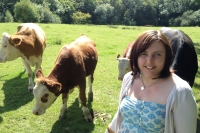Healthy Milk

Dr Sharon Huws
21 August 2013
Dairy products could contain a higher proportion of healthy omega-3 fats all year round, thanks to a discovery reported today (21 August) in the Society for Applied Microbiology’s Journal of Applied Microbiology.
Scientists at the Institute of Biological, Environmental and Rural Sciences (IBERS) at Aberystwyth University have discovered that the chemicals that give cut grass its distinctive ‘green odour’ kill off bacteria that convert healthy omega-3 fats into saturated fats in a cow’s gut.
Dr Sharon Huws, Coleg Cymraeg lecturer in Animal Science at IBERS led the research. She said; “We’ve known for a while that milk contains a greater proportion of the healthy omega-3 fats in the summer, than in the winter, and now we know it’s probably down to the antimicrobial effects of the green odour products from grass.
“Obviously cows can’t be outside all year round but we could, for example, supplement their winter feed with one or more of these chemicals.”
Approximately 4% of whole milk is made up of a mixture of different fats.
Too much saturated fat in the human diet can lead to health problems, including cardiovascular disease. But a proportion of the fats in milk are omega-3 fatty acids, which are generally considered good fats and are thought to have a number of health benefits.
The ratio of omega-3 fats to saturated fats in milk varies across the year and this research potentially answers why in winter, when cows are often housed inside and may not be eating fresh grass or silage, milk is less healthy overall.
Dr Huws added; “Of course, it’s not just milk that would be healthier with the supplemented feed, it would also be all the various products produced from whole milk – butter, cheese, yoghurts, milkshakes, and more.”
This is all good news in a world where the population is set to reach 9 billion by 2050 and the need for nutritious, affordable, accessible, and safe food has never been as important.
The research is ongoing with funding from the Welsh Government with links to industrial partners Waitrose, DairyCrest, Wynnstay,Coombe Farm and Volac.
IBERS receives strategic funding from the Biotechnology and Biological Sciences Research Council (BBSRC).
The title of the article published in the Journal of Applied Microbiology is: “Fatty acid oxidation products (‘green odour’) released from perennial ryegrass following biotic and abiotic stress, potentially have antimicrobial properties against the rumen microbiota resulting in decreased biohydrogenation”, Sharon Huws, Mark Scott, John Tweed, Michael Lee, DOI: 10.1111/jam.12314
Full text available from Ben Norman, Life Sciences Publicist, Wiley Blackwell, benorman@wiley.com.



